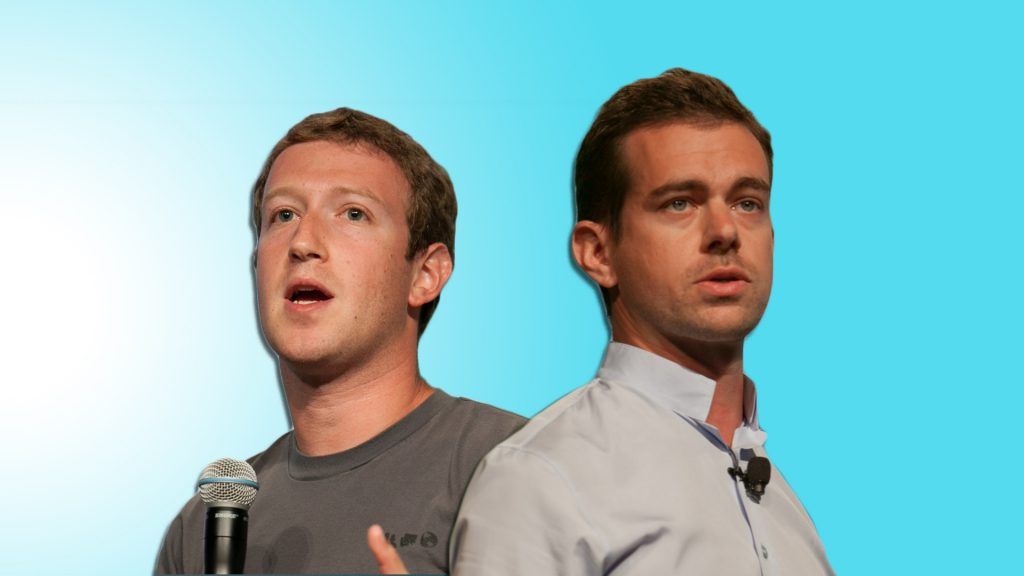The fight over social media’s potent political ads just got more interesting
By Justin Sherman | November 1, 2019
 Facebook CEO Mark Zuckerberg and Twitter CEO Jack Dorsey. The two companies are taking vasty different approaches to political ads on the sites. Dorsey announced Twitter would stop publishing them. Credit: Photos by JD Lasica (CC BY 2.0). Composite by the Bulletin.
Facebook CEO Mark Zuckerberg and Twitter CEO Jack Dorsey. The two companies are taking vasty different approaches to political ads on the sites. Dorsey announced Twitter would stop publishing them. Credit: Photos by JD Lasica (CC BY 2.0). Composite by the Bulletin.
It’s well-known that the Russian government interfered in the 2016 US election by spreading heated disinformation on social media. Foreign agents posted content that stoked racial division and drove emotionally resonant wedges between would-be allies. The trolls found Facebook and Twitter to be conducive to their goals: pushing charged rhetoric, including disinformation, designed to cause chaos. And this included the use of advertisements—for as any major US political campaign knows, there’s nothing quite like using ads to your advantage during an election.
While political ads of all sorts—true ones, false ones, xenophobic ones—appear on TV and in other media, if you’re a domestic politician with a heated message of political combat, perhaps one that strays from a just-the-facts presentation, social media ads can help you push a potentially misleading message with unprecedented precision. The battle lines over what responsibility social media companies have for policing not just organic content posted by users but also paid political advertisements are still being drawn. Twitter CEO Jack Dorsey entered the fray Wednesday and announced that his company would no longer run paid political ads, setting up a striking contrast with Facebook.
“We’ve made the decision to stop all political advertising on Twitter globally,” Dorsey wrote in a Twitter thread. “Internet political ads present entirely new challenges to civic discourse: machine learning-based optimization of messaging and micro-targeting, unchecked misleading information, and deep fakes. All at increasing velocity, sophistication, and overwhelming scale.”
We’ve made the decision to stop all political advertising on Twitter globally. We believe political message reach should be earned, not bought. Why? A few reasons…?
— jack ??? (@jack) October 30, 2019
Internet political ads present entirely new challenges to civic discourse: machine learning-based optimization of messaging and micro-targeting, unchecked misleading information, and deep fakes. All at increasing velocity, sophistication, and overwhelming scale.
— jack ??? (@jack) October 30, 2019
And it’s not just that ads on social media can target users with unprecedented precision; the users themselves are an excellent conduit for spreading false information. A 2018 study conducted by MIT researchers found that false news propagates faster than true news on Twitter. “When we analyzed the diffusion dynamics of true and false rumors,” they wrote, “we found that falsehood diffused significantly farther, faster, deeper, and more broadly than the truth in all categories of information.”
What makes the algorithmically filtered information environments on social media so dangerous for safe and legitimate discourse, then, is how their scale and speed combine with existing human biases. As Peter W. Singer and Emerson Brooking write in their book #LikeWar: The Weaponization of Social Media, where cyberwar is the hacking of computer networks, what they call a LikeWar is the hacking of human minds linked to those networks. And in these new wars, amplification and algorithmic curation are the keys to the game.
That’s why threats to safe and legitimate discourse on social media go far beyond just Russian influence operations, though those remain a considerable threat to elections in the United States and elsewhere. Social media algorithms propagate content from trolls, conspiracy theorists, and white supremacists, for instance, who can “hold the power to amplify particular messages and make otherwise fringe beliefs get mainstream coverage,” researchers wrote in a report for the nonprofit Data & Society. Those with “a particularly nuanced understanding of technological platforms or attention hacking tactics” can get more attention via these online platforms than they might otherwise on, say, radio or television.
Politicians and campaigns are devoting increasingly big budgets to tapping into the algorithmic power of social media advertising. Kantar Media estimates digital ad spending this election cycle will be up to $1.2 billion. President Donald Trump’s re-election campaign spent about $21 million between May and this month on Facebook ads alone, according to Facebook. By contrast, a leading candidate on the Democratic side, Elizabeth Warren, spent $4.7 million in that time.
Many have pointed to profit as the motive for Facebook’s decision to handle political content differently from its normal terms of service. Rep. Alexandria Ocasio-Cortez questioned Facebook CEO Mark Zuckerberg about this in Congress recently, where he dodged questions about whether the platform would allow a candidate to buy an advertisement that outright lies—say, targeting black Americans with ads that Election Day had been moved. Twitter may have even taken a swipe at Facebook on this point, as Dorsey tweeted, “it‘s not credible for us to say: ‘We’re working hard to stop people from gaming our systems to spread misleading info, buuut if someone pays us to target and force people to see their political ad…well…they can say whatever they want!’”
For instance, it‘s not credible for us to say: “We’re working hard to stop people from gaming our systems to spread misleading info, buuut if someone pays us to target and force people to see their political ad…well…they can say whatever they want! ?”
— jack ??? (@jack) October 30, 2019
In the newsletter The Interface, The Verge’s Casey Newton breaks down nicely some of the various facts at play and sides to this event; for instance, he notes that Twitter only presently generates a few million dollars from political ads each year, raising questions about what this new policy will actually do. But there is of course the counterargument that it helpfully stands in contrast to Facebook. Or, as Newton put it, “If you’ve ever wondered about the value of having multiple social networks competing to develop the best products and policies, Wednesday offered us a clear example.”
Regardless of what one thinks of the Twitter decision, however, the debate over what social media companies should or shouldn’t do to moderate political ads on their platforms is hardly over. Democratic discourse—what many want these platforms to enable—depends not just on allowing people to speak but also on discovering truth and better understanding one another. There are serious questions about whether that’s what these algorithm-driven sites do.
Together, we make the world safer.
The Bulletin elevates expert voices above the noise. But as an independent nonprofit organization, our operations depend on the support of readers like you. Help us continue to deliver quality journalism that holds leaders accountable. Your support of our work at any level is important. In return, we promise our coverage will be understandable, influential, vigilant, solution-oriented, and fair-minded. Together we can make a difference.
Keywords: Alexandria Ocasio-Cortez, Facebook, Jack Dorsey, Mark Zuckerberg, Twitter, advertising, fake news
Topics: Disruptive Technologies














